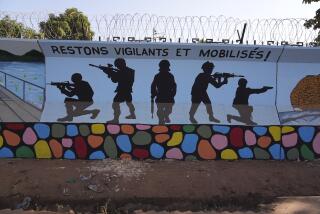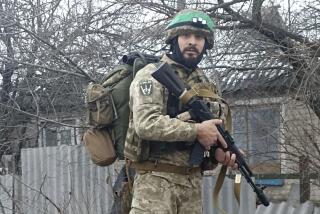Bogota’s bad apples
- Share via
The world is still celebrating Colombia’s spectacular July rescue of 15 hostages held for years in the jungle by leftist insurgents, which will go down in history as a textbook example of planning, cunning and military precision. But amid the rejoicing, it’s becoming increasingly clear that the hostage-takers are not the only murderous thugs on the loose. Colombia needs to turn its attention to the growing number of murders allegedly committed by its armed forces.
Although the Colombian military has long been plagued by criminality and corruption, its recent successes against the Revolutionary Armed Forces of Colombia, or FARC, have diverted attention from its own wrongdoing. But according to a coalition of Colombian human rights groups, the military is killing civilians at an alarming pace -- more than 300 in the last year. Worse, according to the New York-based Fellowship of Reconciliation, 47% of the extrajudicial killings were committed by army units that had been vetted by the U.S. State Department. Such troops are supposed to be the best trained and most sensitive to human rights, making them eligible for U.S. military aid, technology and training.
Collateral damage can be expected in any wide-scale military conflict, but there’s evidence that many of the civilian casualties were not the result of carelessness or misjudgment -- killing people has been the route to higher rank. In Colombia, body counts have been the primary measure of the military’s success against the guerrillas, and noncombatants tell of soldiers shooting innocents, then alleging that the victims belonged to the FARC, just to increase their tally. Last year, the military issued a directive making the capture or demobilization of rebels the standard for measuring achievement and worthiness for promotion. That move should help, but the culprits in extrajudicial killings still must be brought to justice.
Democratic Sen. Patrick J. Leahy of Vermont, chairman of the Senate subcommittee on State Department and foreign operations and the author of a law linking foreign military aid to human rights compliance, has rightly called on Bogota to investigate and prosecute these crimes. The country’s military is operating under a culture of impunity that has to change. Colombia has received more than $4 billion in U.S. aid since 2000, much of which has been used in the successful fight against the FARC. But the U.S. should not be the financial backer of army-sponsored domestic terrorism.
More to Read
A cure for the common opinion
Get thought-provoking perspectives with our weekly newsletter.
You may occasionally receive promotional content from the Los Angeles Times.










